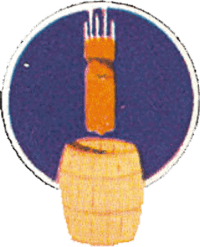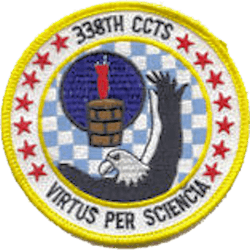338th Combat Crew Training Squadron
| 338th Combat Crew Training Squadron | |
|---|---|
|
Emblem of the 338th Combat Crew Training Squadron | |
| Active | 1942-1993 |
| Country | United States |
| Branch | United States Air Force |
| Type | Combat Crew Training |

The 338th Combat Crew Training Squadron is a currently inactive United States Air Force unit. It was last assigned to the 96th Operations Group, stationed at Dyess Air Force Base, Texas. It was inactivated on October 1, 1993.
History
Established as a B-17 Flying Fortress heavy bomber squadron; trained under Second Air Force. Deployed to European Theater of Operations (ETO), assigned to VIII Bomber Command in England, Flew combat missions over Nazi Germany and Occupied Europe until the German capitulation in May 1945.
Activated as a reserve B-29 Superfortress squadron, 1947. Not equipped or manned; inactivated due to budget reductions, 1949.
Reactivated in 1953 as a Strategic Air Command B-47 Stratojet squadron. Performed global deployments and training until inactivated in 1963. With the phaseout of the B-47 the training aircraft sent to storage at Davis-Monthan and the squadron was inactivated.
Reactivated in 1986 as a B-1B Lancer training squadron, assuming assets of 4018th Combat Crew Training Squadron which was activated in 1985 when B-1s first arrived at Dyess.
On September 28, 1987, a squadron B-1B Lancer 84-0052 suffered a bird strike during a Radar Bomb Scoring training mission to the Strategic Training Range Complex serviced by the La Junta Bomb Plot radar site. An American White Pelican struck the Rockwell B-1 Lancer traveling at 600 ft (180 m) and about 645 mph (1,038 km/h) with 6 military aboard, and the damage caused a fire. The instructor pilot took control and flew the B-1B to 3,500 ft after which the crash occurred.[1]
The copilot's ejection seat failed and 2 others in jump seats were unable to successfully bail out, killing Maj. James T. Acklin (instructor pilot, age 37), 1st Lt. Ricky M. Bean (student pilot, 27), and Maj. Wayne D. Whitlock (instructor defensive systems officer, 39). The student defensive systems officer, student aircraft commander, and instructor offensive systems officer successfully ejected and were treated for minor injuries at the USAF Academy hospital. A 5,000 ft (1,500 m) low-level restriction was temporarily enacted,[1] and modifications to increase the aircraft design from 6 pounds to withstand a 10 pound strike were complete by December 1988.[2]
The squadron was inactivated in 1993 as part of the drawdown of the USAF after the end of the Cold War.
Lineage
- Constituted 338th Bombardment Squadron (Heavy) on 28 January 1942
- Activated on 15 July 1942
- Inactivated on 19 December 1945
- Redesignated 338th Bombardment Squadron (Very Heavy) on 13 May 1947
- Activated in the reserve on 29 May 1947
- Inactivated on 27 June 1949
- Redesignated 338th Bombardment Squadron (Medium) on 6 November 1953
- Activated on 18 November 1953.
- Inactivated on 15 March 1963.
- Redesignated: 338th Strategic Bombardment Training Squadron, and activated on 1 July 1986
- Organized on 1 July 1986, assuming personnel/equipment/aircraft of 4018th Combat Crew Training Squadron
- Redesignated: 338th Combat Crew Training Squadron on 1 June 1987
- Inactivated on 1 October 1993
Assignments
- 96th Bombardment Group, 15 July 1942 – 15 December 1945
- 96th Bombardment Group, 29 May 1947
- 384th Bombardment Group, 8 October 1947 – 27 June 1949
- 96th Bombardment (later Strategic Aerospace) Wing, 18 November 1953 – 15 March 1963
- 96th Bombardment Wing, 1 July 1986
- 96th Operations Group, 1 September 1991 – 1 October 1993
Stations
|
|
Aircraft
- B-17 Flying Fortress, 1943–1945
- B-47 Stratojet, 1955–1963
- B-1B Lancer, 1986–1993
References
![]() This article incorporates public domain material from the Air Force Historical Research Agency website http://www.afhra.af.mil/.
This article incorporates public domain material from the Air Force Historical Research Agency website http://www.afhra.af.mil/.
- Maurer, Maurer, ed. (1983) [1961]. Air Force Combat Units of World War II (PDF) (reprint ed.). Washington, DC: Office of Air Force History. ISBN 0-912799-02-1. LCCN 61060979.
- Maurer, Maurer, ed. (1982) [1969]. Combat Squadrons of the Air Force, World War II (PDF) (reprint ed.). Washington, DC: Office of Air Force History. ISBN 0-405-12194-6. LCCN 70605402. OCLC 72556.


